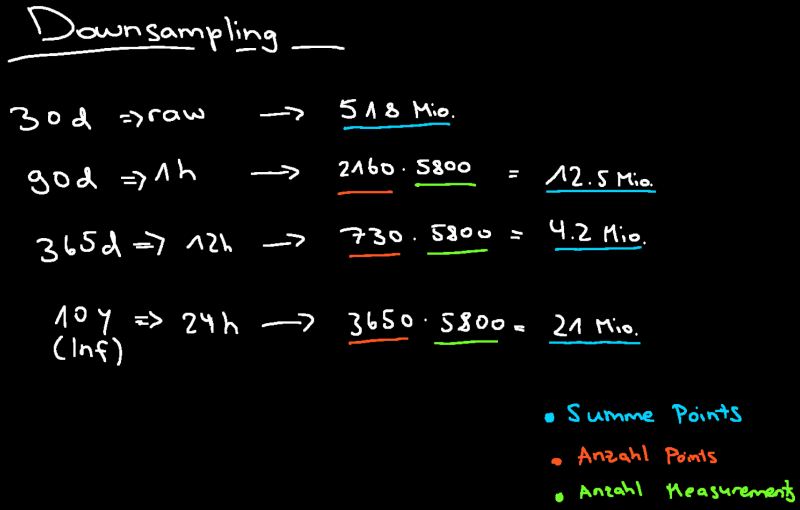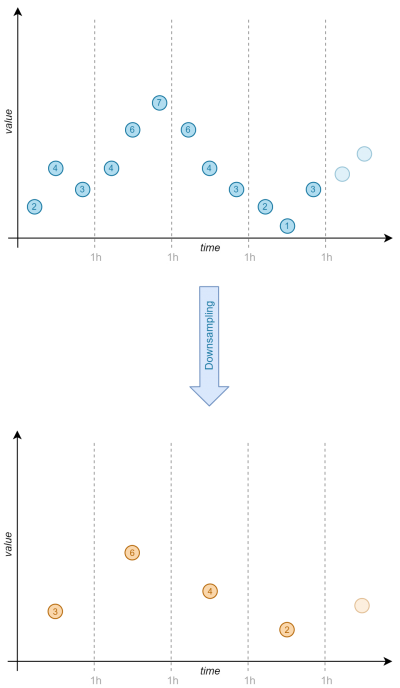InfluxDB 2.x: Task: Downsampling: Unterschied zwischen den Versionen
Admin (Diskussion | Beiträge) |
Admin (Diskussion | Beiträge) K (Admin verschob die Seite InfluxDB: Task: Downsampling nach InfluxDB 2.x: Task: Downsampling, ohne dabei eine Weiterleitung anzulegen) |
||
| (10 dazwischenliegende Versionen des gleichen Benutzers werden nicht angezeigt) | |||
| Zeile 1: | Zeile 1: | ||
| − | [[Datei:00-influxdb downsampling.png|400px|right | + | [[Datei:00-influxdb downsampling.png|thumb|400px|right]] |
| − | The following downsampling examples calculates | + | The following downsampling examples calculates '''every hour the mean value (for an two hour window) of every series and writes in a new Influx Database''' respectively Influx bucket. |
| Zeile 20: | Zeile 20: | ||
|> to(bucket: "<DESTINATION_BUCKET>", org: "<YOUR_INFLUX_ORGANISATION>") | |> to(bucket: "<DESTINATION_BUCKET>", org: "<YOUR_INFLUX_ORGANISATION>") | ||
</pre> | </pre> | ||
| − | |||
| − | |||
| − | |||
''More information's about "Flux Tasks": https://docs.influxdata.com/influxdb/v2.0/process-data/common-tasks/downsample-data/#example-downsampling-task-script | ''More information's about "Flux Tasks": https://docs.influxdata.com/influxdb/v2.0/process-data/common-tasks/downsample-data/#example-downsampling-task-script | ||
| − | == InfluxQL - InfluxDB 1.x == | + | == InfluxQL (Continuous Queries) - InfluxDB 1.x == |
''InfluxQL is an SQL-like query language for interacting with InfluxDB. It has been crafted to feel familiar to those coming from other SQL or SQL-like environments while also providing features specific to storing and analyzing time series data. However InfluxQL is not SQL and lacks support for more advanced operations like UNION, JOIN and HAVING that SQL power-users are accustomed to. This functionality is available with Flux.'' | ''InfluxQL is an SQL-like query language for interacting with InfluxDB. It has been crafted to feel familiar to those coming from other SQL or SQL-like environments while also providing features specific to storing and analyzing time series data. However InfluxQL is not SQL and lacks support for more advanced operations like UNION, JOIN and HAVING that SQL power-users are accustomed to. This functionality is available with Flux.'' | ||
<pre> | <pre> | ||
| − | CREATE CONTINUOUS QUERY <CONTINUOUS_QUERY_NAME> ON <INFLUXDB_NAME> BEGIN SELECT mean(*) INTO <INFLUXDB_NAME>.<DESTINATION_RETENTION_POLICY_NAME>.:MEASUREMENT FROM <SOURCE_INFLUXDB_NAME>.<SOURCE_RETENTION_POLICY_NAME>./.*/ GROUP BY time(1h), * END | + | CREATE CONTINUOUS QUERY <CONTINUOUS_QUERY_NAME> ON <INFLUXDB_NAME> |
| + | BEGIN | ||
| + | SELECT mean(*) | ||
| + | INTO <INFLUXDB_NAME>.<DESTINATION_RETENTION_POLICY_NAME>.:MEASUREMENT | ||
| + | FROM <SOURCE_INFLUXDB_NAME>.<SOURCE_RETENTION_POLICY_NAME>./.*/ | ||
| + | GROUP BY time(1h), * | ||
| + | END | ||
</pre> | </pre> | ||
| − | |||
| − | |||
| − | |||
| − | |||
''More information's about "Continuous Queries": https://docs.influxdata.com/influxdb/v1.8/query_language/continuous_queries/'' | ''More information's about "Continuous Queries": https://docs.influxdata.com/influxdb/v1.8/query_language/continuous_queries/'' | ||
| − | |||
| − | |||
| Zeile 52: | Zeile 49: | ||
[[Datei:01-influxdb downsampling.png|800px]]<br> | [[Datei:01-influxdb downsampling.png|800px]]<br> | ||
''red = number of Metric-points, green = number of series, blue = total Metric-points'' <br> | ''red = number of Metric-points, green = number of series, blue = total Metric-points'' <br> | ||
| + | |||
| + | |||
| + | |||
| + | |||
| + | = Downsampling Errors = | ||
| + | == Unsupported aggregate column type string == | ||
| + | === Cause === | ||
| + | Your downsampling tasks are failing with the error message '''Unsupported aggregate column type string'''. | ||
| + | This is because you have some '''_value with strings in it'''. InfluxDB cannot aggregate on values with strings or on datatype string. | ||
| + | |||
| + | === Workaround === | ||
| + | *Find the measurements with strings in "_value" with following search query: | ||
| + | <pre> | ||
| + | from(bucket: "<YOUR_BUCKET>") | ||
| + | |> range(start: v.timeRangeStart, stop: v.timeRangeStop) | ||
| + | |> filter(fn: (r) => r._value =~ /\D/) | ||
| + | |> group(columns: ["_measurement"]) | ||
| + | </pre> | ||
| + | *Filter out these measurements in your InfluxDB task by adding following filter statement: | ||
| + | <pre> | ||
| + | ... | ||
| + | |> filter(fn: (r) => r._measurement != "<MEASUREMENTS_WITH_STRINGS>") | ||
| + | ... | ||
| + | </pre> | ||
| + | |||
| + | === Solution === | ||
| + | ''Unfortunately until now InfluxDB 2.x offers no solution for this.'' | ||
| + | |||
| + | |||
Aktuelle Version vom 3. Februar 2022, 09:52 Uhr
The following downsampling examples calculates every hour the mean value (for an two hour window) of every series and writes in a new Influx Database respectively Influx bucket.
Inhaltsverzeichnis
[Verbergen]Flux (Tasks) - InfluxDB 2.x
Flux is InfluxData’s functional data scripting language designed for querying, analyzing, and acting on data. Beginning with InfluxDB 1.8.0, Flux is available for production use along side InfluxQL.
option task = {name: "<TASK_NAME>", every: 1h}
data = from(bucket: "<SOURCE_BUCKET>")
|> range(start: -duration(v: int(v: task.every) * 2))
|> filter(fn: (r) =>
(r._measurement =~ /.*/))
data
|> aggregateWindow(fn: mean, every: 1h)
|> filter(fn: (r) =>
(exists r._value))
|> to(bucket: "<DESTINATION_BUCKET>", org: "<YOUR_INFLUX_ORGANISATION>")
More information's about "Flux Tasks": https://docs.influxdata.com/influxdb/v2.0/process-data/common-tasks/downsample-data/#example-downsampling-task-script
InfluxQL (Continuous Queries) - InfluxDB 1.x
InfluxQL is an SQL-like query language for interacting with InfluxDB. It has been crafted to feel familiar to those coming from other SQL or SQL-like environments while also providing features specific to storing and analyzing time series data. However InfluxQL is not SQL and lacks support for more advanced operations like UNION, JOIN and HAVING that SQL power-users are accustomed to. This functionality is available with Flux.
CREATE CONTINUOUS QUERY <CONTINUOUS_QUERY_NAME> ON <INFLUXDB_NAME> BEGIN SELECT mean(*) INTO <INFLUXDB_NAME>.<DESTINATION_RETENTION_POLICY_NAME>.:MEASUREMENT FROM <SOURCE_INFLUXDB_NAME>.<SOURCE_RETENTION_POLICY_NAME>./.*/ GROUP BY time(1h), * END
More information's about "Continuous Queries": https://docs.influxdata.com/influxdb/v1.8/query_language/continuous_queries/
Example calculation of total Metric-points per bucket
For example we are writting 200 Metric-points per second, this means:
- ~ 12'000 Metric-points per minute
- ~ 720'000 Metric-points per hour
- ~ 17'000'000 Metric-points per day
- ~ 518'000'000 Metric-points per month
Assumption we have following Buckets (Influx databases):

red = number of Metric-points, green = number of series, blue = total Metric-points
Downsampling Errors
Unsupported aggregate column type string
Cause
Your downsampling tasks are failing with the error message Unsupported aggregate column type string. This is because you have some _value with strings in it. InfluxDB cannot aggregate on values with strings or on datatype string.
Workaround
- Find the measurements with strings in "_value" with following search query:
from(bucket: "<YOUR_BUCKET>") |> range(start: v.timeRangeStart, stop: v.timeRangeStop) |> filter(fn: (r) => r._value =~ /\D/) |> group(columns: ["_measurement"])
- Filter out these measurements in your InfluxDB task by adding following filter statement:
... |> filter(fn: (r) => r._measurement != "<MEASUREMENTS_WITH_STRINGS>") ...
Solution
Unfortunately until now InfluxDB 2.x offers no solution for this.
